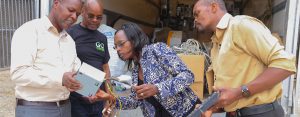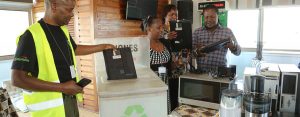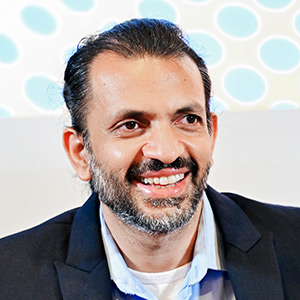In October 2012, the Safaricom e-waste management programme was launched with the objective of providing an end-to-end management solution for out of use electronic gadgets. When exploring why they wanted to start this initiative, the Safaricom team quoted a well-known Mahatma Gandhi saying, “If you are not part of the solution, you are part of the problem”.
The root cause
With the high rate of tech evolution, and more people wanting to buy high-tech equipment at a cheaper price, there is an influx of counterfeit products in low & middle-income countries. This is the same for the Kenyan market where the lifecycle of many electronic devices is shorter than the genuine products. This has led to high levels of e-waste production thus threatening the entire value chain.
It is estimated that in Kenya over 35 million people use electronic devices, mainly mobile phones. Safaricom for example, introduces about 1.2 million handsets into the market every year. This translates to about 120 tonnes of electronics once they reach end of life. As a responsible business, Safaricom believes it is their duty to do ‘their-part’ by running a comprehensive e-waste management programme.
 About the Safaricom e-waste management project
About the Safaricom e-waste management project
Safaricom has integrated the Sustainable Development Goals (SDGs) in its operations. The e-waste management project falls under SDG 12 – Responsible Consumption and Production implementation.
The initiative aims to collect all types of old electronics including (but not limited to) radios, phones, laptops, batteries and chargers and related accessories, and hands them in to a recycling partner – Waste Electrical and Electronic Equipment Centre (WEEE). The WEEE Centre disassembles the gadgets, separating them into different parts, and then recycles the locally recyclable materials and sends the non-recyclable materials to other partners outside of the country for safe end of life management.
The Safaricom team designed this programme in partnership with the National Environment Management Authority (NEMA) and with the endorsement of the Communication Authority of Kenya (CA).
Objectives and KPIs
They key objectives of this project are:
- To educate the public on the need for proper e-waste management.
- To collect e-waste from the market and to handle end-of-life management in a responsible way, contributing to a cleaner environment.
- To encourage and promote wider participation from multiple stakeholders in the e-waste management process.
Through the programme, Safaricom has collected 1,287 tonnes of e-waste for recycling.
Customer journey
Zooming in on the processes and steps of the programme, there are four main components of the project. These components highlight the effort that Safaricom take when collecting e-waste from customers; most importantly without providing them with a financial reward for the e-waste customers handover. The ‘environmental responsibility’ of each customer is rewarded by proper, systematic and safe end of life management of e-waste by Safaricom.
- Public awareness
- E-waste collection
- Customer service
- Transport & recycling
1. Public awareness
Flier distribution – brand ambassadors distribute leaflets. The fliers have information on what e-waste is, the importance of proper management of e-waste and location of our collection centres.
Awareness sessions – Safaricom rig goes around targeted communities/residential estates. We also used national and vernacular radio stations and TVs.
International E-Waste Day – this day is celebrated in many countries every year. In last two years, on October 13 we work with other partners to celebrate the day with focus being raining awareness and collection of e-waste mainly from government ministries and other public institutions.
Communication to government ministries and other public institutions – we have also written letters to all government departments requesting them to dispose their electronic waste through our programme. We have received a positive response from some of them.
2. E-waste collection
There are multiple types of collections carried out by the Safaricom team:
Internal staff campaigns – to create regular awareness and for internal collection from staff.
Safaricom retail centres and offices – there are 50+ retail shops and collection points, with specialised boxes placed strategically for customers or the public to drop their e-waste
Collection rig – the rig travels round the residential estates and urban centres, raising awareness and collecting e-waste from the communities.
Partner institutions – technical educational/polytechnic institutions and other private partners support collection within their sites.
3. Customer service
Safaricom Customer Care and the Environment and Sustainability teams answer all queries related to e-waste recycling.
4. Transport and recycling
The WEEE Centre transports the e-waste from collection centres to their recycling workspace. In these, they manage the cleaning, dismantling and initial recycling of different parts. For more complex and hazardous parts where technology does not exist in Kenya for safe handling, they work with partners mainly in Europe for further processing and safe disposal of hazardous parts.
The business case and the sustainability of the project
This recycling programme is a social enterprise for Safaricom’s recycling partner (WEEE Centre). The sustainability of this programme depends on the volumes collected. Safaricom sees the success of the project as a demonstration of their social responsibility efforts and also extended producer responsibility.
The Kenyan government is preparing to finalise the National e-waste legislation that promotes recycling and extended producer responsibility. Safaricom team anticipates that once the legislation is passed, the project would strengthen Safaricom’s adherence to the EPR guidelines and also enable them to support the informal sector to be more formal.
Understanding the critical role played by the informal sector, the Safaricom team is working together with the informal sector by collecting discarded e-waste from their facilities. Most repairers in the informal sector dismantle and remove useful parts from old equipment. Safaricom steps forward to collect the unutilised waste from this process and thereby helping the informal sector to discard hazardous e-waste particles without dumping it irresponsibly. The Safaricom team expects the new regulation when fully implemented would provide sufficient incentives to accelerate this engagement.
 What’s required for further scale?
What’s required for further scale?
After setting up a voluntary e-waste management scheme, collecting more than 1,300 tonnes of e-waste the Safaricom team has several items in their wish-list to scale the project to the next level.
- Implementation of relevant laws and regulations to incentivise recycling.
- More producer’s involvement in end of life of the equipment they introduce into the market.
- Incentives – Finding out a sustainable way to encourage users to drop their waste for recycling/re-use.
- Expand partnerships to include government, UN Institutions, development partners and learning institutions.
- Recycling technology – not all e-waste parts are processed locally. If the technology could be set up locally, then the process would be less costly and more efficient.


